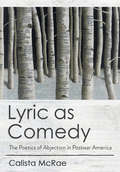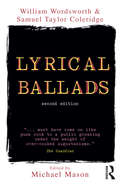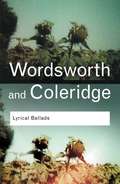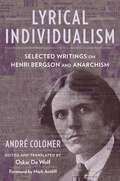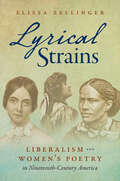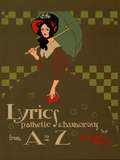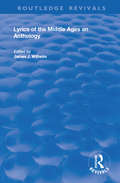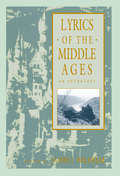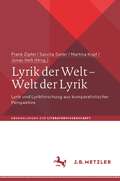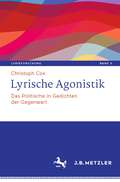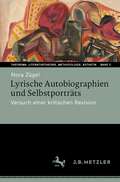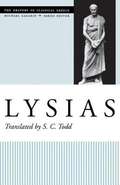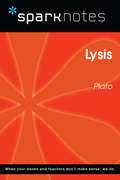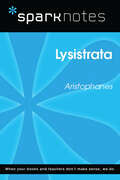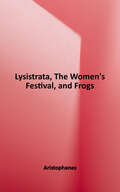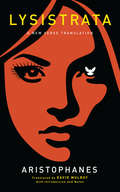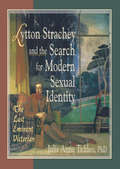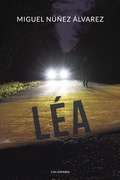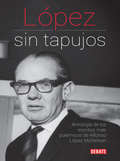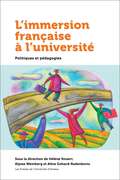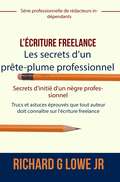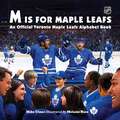- Table View
- List View
Lyric as Comedy: The Poetics of Abjection in Postwar America
by Calista McRaeA poet walks into a bar... In Lyric as Comedy, Calista McRae explores the unexpected comic opportunities within recent American poems about deeply personal, often embarrassing, experiences. Lyric poems, she finds, can be surprising sites of a shifting, unruly comedy, as seen in the work of John Berryman, Robert Lowell, A. R. Ammons, Terrance Hayes, Morgan Parker, Natalie Shapero, and Monica Youn. Lyric as Comedy draws out the ways in which key American poets have struggled with persistent expectations about what expressive poetry can and should do. McRae reveals how the modern lyric, rather than bestowing order on the poet's thoughts and emotions, can center on impropriety and confusion, formal breakage and linguistic unruliness, and self-observation and self-staging. The close readings in Lyric as Comedy also provide new insight into the theory and aesthetics of comedy, taking in the indirect, glancing comic affordances of poetry. In doing so, McRae captures varieties of humor that do not align with traditional terms, centering abjection and pleasure as facets of contemporary lyric practice.
Lyric in the Renaissance
by Ullrich LangerMoving from a definition of the lyric to the innovations introduced by Petrarch's poetic language, this study goes on to propose a new reading of several French poets (Charles d'Orléans, Ronsard, and Du Bellay), and a re-evaluation of Montaigne's understanding of the most striking poetry and its relation to his own prose. Instead of relying on conventional notions of Renaissance subjectivity, it locates recurring features of this poetic language that express a turn to the singular and that herald lyric poetry's modern emphasis on the utterly particular. By combining close textual analysis with more modern ethical concerns this study establishes clear distinctions between what poets do and what rhetoric and poetics say they do. It shows how the tradition of rhetorical commentary is insufficient in accounting for this startling effectiveness of lyric poetry, manifest in Petrarch's Rime Sparse and the collections of the best poets writing after him.
Lyrical Ballads
by Michael MasonLyrical Ballads by William Wordsworth and Samuel Taylor Coleridge is a unique work of literature. first published in 1798, it marked a radical change in the direction of English Literature. Lyrical Ballads represented a movement away from the overwrought, highly formal and learned verse of the 18th century and in so doing ushered in a new, more democratic poetic era. Written in the language of the common man and addressing the concerns of the common man, Lyrical Ballads was the first - and remains the most - truly revolutionary collection of poetry, paving the way for the great Romantic poets - keats, Byron, Shelley et al. - and proving that, while there was no actual revolution on the ground, England could still be the most revolutionary of places. Lyrical Ballads was not a single phenomenon but a sequence of four editions spread over seven years; its appearance in English literature was not a historical moment but a sequence of moments - 1798, 1800, 1802, 1805. This edition - based on the 1805 edition, but looking back on each of the previous publications - shows how this collection developed, how it was refined and added to by the authors. No other edition on the market has such a wealth of key background information.
Lyrical Ballads (Routledge Classics)
by Samuel Taylor Coleridge William WordsworthWhen it was first published, Lyrical Ballads enraged the critics of the day: Wordsworth and Coleridge had given poetry a voice, one decidedly different to that which had been voiced before. This acclaimed Routledge Classics edition offers the reader the opportunity to study the poems in their original contexts as they appeared to Coleridge’s and Wordsworth’s contemporaries, and includes some of their most famous poems, including Coleridge’s Rime of the Ancyent Marinere.
Lyrical Individualism: Selected Writings on Henri Bergson and Anarchism (Columbia Themes in Philosophy, Social Criticism, and the Arts)
by Andre ColomerIn the early twentieth century, André Colomer was perhaps the best-known figure in the anarchist movement. A poet, philosopher, activist, and public speaker, he was enmeshed in the Parisian political and artistic scene at a time of political and cultural revolution. Amid the avant-garde explosions of Cubism, futurism, and surrealism and the ferment of radical politics on left and right, Colomer became anarchism’s leading advocate. He galvanized the Parisian public through his agitational writing and organizing, as well as his involvement in a sensational murder case, while developing a distinctive philosophical account of anarchist individualism. Yet Colomer died in obscurity in Moscow, abandoned by his friends and comrades, and is scarcely known in the English-speaking world today.Lyrical Individualism presents a selection of Colomer’s crucial writings, with a focus on anarchist theory and the philosophy of Henri Bergson. It reveals the richness of Colomer’s philosophical work, particularly his creative engagement with Bergson, Max Stirner, and Friedrich Nietzsche to forge a novel anarchist ideology. Colomer’s writings not only offer valuable insights into interwar anarchism, they also present a distinctive philosophical vision that in many ways anticipates theories and debates animating radical political movements today. This book also showcases his acerbic and pugnacious political commentary on the turbulent events of the 1910s and 1920s. The first translation and publication of Colomer’s work since his untimely death in 1931, Lyrical Individualism allows a range of readers to discover this vital thinker.
Lyrical Strains: Liberalism and Women's Poetry in Nineteenth-Century America
by Elissa ZellingerIn this book, Elissa Zellinger analyzes both political philosophy and poetic theory in order to chronicle the consolidation of the modern lyric and the liberal subject across the long nineteenth century. In the nineteenth-century United States, both liberalism and lyric sought self-definition by practicing techniques of exclusion. Liberalism was a political philosophy whose supposed universals were limited to white men and created by omitting women, the enslaved, and Native peoples. The conventions of poetic reception only redoubled the sense that liberal selfhood defined its boundaries by refusing raced and gendered others. Yet Zellinger argues that it is precisely the poetics of the excluded that offer insights into the dynamic processes that came to form the modern liberal and lyric subjects. She examines poets—Frances Sargent Osgood, Elizabeth Oakes Smith, Frances Ellen Watkins Harper, Edna St. Vincent Millay, and E. Pauline Johnson—whose work uses lyric practices to contest the very assumptions about selfhood responsible for denying them the political and social freedoms enjoyed by full liberal subjects. In its consideration of politics and poetics, this project offers a new approach to genre and gender that will help shape the field of nineteenth-century American literary studies.
Lyrics Pathetic & Humorous from A to Z
by Edmund DulacA treasure for readers and book lovers of all ages, this dazzling children's alphabet is graced by the work of Edmund Dulac, a preeminent twentieth-century illustrator. Dulac provides a limerick for each letter of the alphabet, in addition to twenty-four related illustrations of people and animals in whimsical situations.Dulac possessed an endearing gift for caricature, and his use of jewel-toned, glowing colors adds vivid life to these fantasy images. A facsimile of an extremely valuable 1906 edition, this volume faithfully re-creates the original publication's luminous splendor.
Lyrics of the Middle Ages: An Anthology (Routledge Revivals #Vol. 1268)
by James J. WilhelmOriginally published in 1990, the main purpose of this anthology is to present the vernacular secular lyric of the Middle Ages, although it also includes Latin literature of the Middle Ages and the influence of the hymn.
Lyrics of the Middle Ages: An Anthology (Routledge Revivals Ser.)
by James J. WilhelmFirst published in 1990. Routledge is an imprint of Taylor & Francis, an informa company.
Lyrik der Welt – Welt der Lyrik: Lyrik und Lyrikforschung aus komparatistischer Perspektive (Abhandlungen zur Literaturwissenschaft)
by Martina Kopf Frank Zipfel Sascha Seiler Jonas HeßLyrik und Lyriktheorie wurden in der Komparatistik oft vernachlässigt. Aufgrund der besonderen Sprachgebundenheit von Lyrik ist es zwar nicht selbstverständlich, sie aus einer transnationalen, sprachübergreifenden Perspektive zu untersuchen, allerdings bleiben dann wichtige Aspekte der internationalen zeitgenössischen Lyrikproduktion und der Lyriktradition unerkannt und unerforscht. Dieser Sammelband liefert einen Beitrag zur Schließung dieser Lücke, indem er das komplexe Verhältnis zwischen „Lyrik“ und „Welt“ aus komparatistischer Perspektive untersucht und reflektiert. In der Nachfolge von Konzepten wie Goethes Weltpoesie, Ezra Pounds world poetry oder Enzensbergers poetischer Weltsprache, wird die Internationalität der Lyrik in ihrer Verbindung mit verschiedenen ‚Welten‘ beleuchtet: ihr Bezug zur Lebenswelt, ihr Stellung in der Medienwelt, ihre Erforschung in der Wissenschaftswelt.
Lyrische Agonistik: Das Politische in Gedichten der Gegenwart (Lyrikforschung. Neue Arbeiten zur Theorie und Geschichte der Lyrik #3)
by Christoph CoxAusgehend von der These, dass es sich bei der politischen Lyrik der Gegenwart vor allem um eine Lyrik des Politischen, eine lyrische Streitkultur handelt, wird in „Lyrische Agonistik. Das Politische in Gedichten der Gegenwart“ auf der Basis einer philosophischen ‚neue‘ Rhetorik und mit Rückbezug auf Ansätze der radikalen Demokratietheorie insbesondere von Chantal Mouffe und Ernesto Laclau eine neuartige rhetorische Methode zur Analyse des Politischen in der Lyrik der Gegenwart entwickelt. Grundlegend für diese Methode ist die von sophistischer Rhetoriktradition und radikaler Demokratietheorie geteilte Skepsis gegenüber allen epistemischen Letztbegründungsversuchen. Das Politische in der Lyrik der Gegenwart erweist sich im Kontext dieser beiden Bezugspunkte als die Zurückweisung fundamentaler Gründungversuche, die sich als diskursive Form der Verhandlung einer nur plausiblen, in ihrer Kontingenz stets angreifbaren Politik äußert. Ablesbar wird diese postfundamentalistische Wende in gegenwärtigen Gedichten anhand von rhetorischen Widersprüchen, die auf den unaufhebbaren konflikthaften Charakter des Politischen hindeuten, deren notwendige Gegenseite der ebenso rhetorisch ausgearbeitete Versuch ist, umstrittene Diskurse zugunsten einer nie letztbegründbaren Position zu hegemonisieren. Aufgezeigt wird das dem Politischen eigene Spiel aus Kontingenzerfahrung und Schließungsbemühungen anhand von drei disparaten Textbeispielen politischer Lyrik der letzten zehn Jahre: Tom Schulz’ „Die Maschinen sind volljährig“, Günter Grass’ „Was gesagt werden muss“ und Monika Rincks „was machen die frauen am sonntag?“.
Lyrische Autobiographien und Selbstporträts: Versuch einer kritischen Revision (Theorema. Literaturtheorie, Methodologie, Ästhetik #2)
by Nora ZügelDas Buch widmet sich der Erforschung von ‚lyrischen Selbstentwürfen‘, also lyrischen Texten, die Textmerkmale aufweisen, auf Grund derer LeserInnen mit guten Gründen annehmen können, dass diese eine literarische Selbstthematisierung ihres Verfassers oder ihrer Verfasserin darstellen. Verschiedene literaturwissenschaftliche Grundannahmen – insbesondere der konventionalisierte Anspruch, ‚lyrisches Ich‘ und AutorIn streng zu unterscheiden – haben eine umfängliche Auseinandersetzung mit ihnen bis in die Gegenwart erschwert. Ausgehend von Widersprüchen, Inkonsistenzen oder Leerstellen bisheriger Interpretationspraktiken und theoretischer Konzepte zielt die Studie darauf, eine Theorie des lyrischen Selbstentwurfs auszuarbeiten und hierdurch lyrische Werke, die eine Referenz auf ihren Autor oder ihre Autorin anbieten, stärker in das Bewusstsein der Literaturwissenschaft zu rücken und als eigene Textsorte klarer zu konturieren. Aus diesen Zielsetzungen folgt der zweiteilige Aufbau der Untersuchung: Teil I unterwirft etablierte Praktiken, Theorien und Begriffe einer kritischen Revision, Teil II schließt auf Basis der erfolgten Bestandsaufnahme ausgemachte konzeptuelle Lücken, entwickelt ergänzende Analysebegriffe, zeigt ihre Verwendungsmöglichkeiten an konkreten Beispielen auf und bindet die zunächst abstrakt bleibenden Ausführungen an konkrete Texte zurück, wodurch zugleich die Vielfalt der existierenden Erscheinungsformen der betrachteten Gattung veranschaulicht wird. Damit ist die Arbeit vor allem als literaturtheoretische Grundlagenforschung einzuordnen, liefert darüber hinaus aber auch Interpretationen exemplarischer Textbeispiele (u.a. von Oswald von Wolkenstein, Goethe, Droste-Hülshoff, Brecht, Rilke, Jandl, Mayröcker, Jan Wagner). Die kritischen, forschungsgeschichtlich und praxeologisch perspektivierten Fragen fokussieren sich unter anderem auf die Begriffe des „lyrischen Ichs“, des „Sprechers“, des „abstrakten Autors“, auf bisherige Versuche einer Positionsbestimmung der Lyrik zwischen Fiktionalität und Faktualität und auf die Marginalisierung der Lyrik innerhalb der Autobiographieforschung.
Lysias
by S. C. ToddThis is the second volume in the Oratory of Classical Greece series. Planned for publication over several years, the series will present all of the surviving speeches from the late fifth and fourth centuries B.C. in new translations prepared by classical scholars who are at the forefront of the discipline. These translations are especially designed for the needs and interests of today's undergraduates, Greekless scholars in other disciplines, and the general public.<P><P>Classical oratory is an invaluable resource for the study of ancient Greek life and culture. The speeches offer evidence on Greek moral views, social and economic conditions, political and social ideology, and other aspects of Athenian culture that have been largely ignored: women and family life, slavery, and religion, to name just a few.
Lysis (SparkNotes Philosophy Guide)
by SparkNotesLysis (SparkNotes Philosophy Guide) Making the reading experience fun! SparkNotes Philosophy Guides are one-stop guides to the great works of philosophy–masterpieces that stand at the foundations of Western thought. Inside each Philosophy Guide you&’ll find insightful overviews of great philosophical works of the Western world.
Lysistrata (SparkNotes Literature Guide Series)
by SparkNotesLysistrata (SparkNotes Literature Guide) by Aristophanes Making the reading experience fun! Created by Harvard students for students everywhere, SparkNotes is a new breed of study guide: smarter, better, faster. Geared to what today's students need to know, SparkNotes provides: *Chapter-by-chapter analysis *Explanations of key themes, motifs, and symbols *A review quiz and essay topicsLively and accessible, these guides are perfect for late-night studying and writing papers
Lysistrata, The Women's Festival, and Frogs (Oklahoma Series in Classical Culture #Volume Forty-Two)
by Aristophanes Michael EwansMost readers nowadays encounter the plays of Aristophanes in the classroom, not the theater. Yet the "father of comedy" wrote his plays for the stage, not as literary texts. Many English translations of the plays were written decades ago, and in their outdated language, they fail to capture the dramatic liveliness of the original comedies. Now Michael Ewans offers new and lively translations of three of Aristophanes' finest plays: Lysistrata, The Women's Festival, and Frogs. While remaining faithful to the original Greek, these translations are accessible to a modern audience--and actable on stage. Here readers will discover--in all its uncensored glory--the often raw sexual and scatological language Aristophanes used in his fantastically inventive works. <p><p>This edition also contains all that a reader needs to understand the plays within a broader context. In his comprehensive introduction, Ewans discusses the political and social aspects of Aristophanic comedy, the conventions of Greek theater, and the challenges of translating ancient Greek into modern English. In his theatrical commentaries--a unique feature of this edition--Ewans draws on his own experience of directing the plays in a replica of the original theater. In scene-by-scene analysis, he provides insight into the major issues each play raises in performance. The volume concludes with two glossaries--one of proper names and the other of Greek terms--as well as a bibliography that includes the most recent scholarship on Aristophanic comedy.
Lysistrata: A New Verse Translation
by AristophanesAristophanes, a native Athenian and the leading exponent of Greek comedy, was born c. 450 BCE. Today forty-three of his plays are known by title; eleven survive. The most famous of these is the whimsical fantasy Lysistrata. A perennial classroom and stage favorite as well as the basis of Spike Lee’s Chi-Raq, the play is as relevant today as it was 2,500 years ago. The premise is simplicity itself: to end the Peloponnesian War, women decide to withhold sex from their husbands until the fighting stops. The play is by turns raucous, bawdy, frantic, and funny. David Mulroy’s exciting new translation retains the original’s verse format, racy jokes, and vibrancy—setting it apart from previous efforts, which are typically reproduced as prose or depart from meaning and meter. His introduction offers a concise summary of Aristophanes’ life and social milieu, including a brief overview of the Peloponnesian War, which took place during the playwright’s lifetime. The appendices include guides on translating meter and Greek pronunciation for aspiring thespians.
Lytton Strachey and the Search for Modern Sexual Identity: The Last Eminent Victorian
by Julie Anne TaddeoExamine Lytton Strachey’s struggle to create a new homosexual identity and voice through his life and work!This study of Lytton Strachey, one of the neglected voices of early twentieth-century England, uses his life and work to re-evaluate early British modernism and the relationship between Strachey’s sexual rebellion and literature.A perfect ancillary textbook for courses in history, literature, and women’s studies, Lytton Strachey and the Search for Modern Sexual Identity: The Last Eminent Victorian contributes to the expanding field of queer studies from an historian’s perspective. It looks at homosexuality through the eyes of Lytton Strachey as opposed to the too-often analyzed Oscar Wilde and E.M. Forster. Questioning the idea that homosexuality is a “transgressive rebellion,” as Strachey as well as scholars on Bloomsbury have insisted, this volume focuses on the ongoing conflict between Strachey’s Victorian notions of class, gender, and race, and his desire to be modern.Linking Strachey’s life and work to the larger movement of English modernism, Lytton Strachey and the Search for Modern Sexual Identity examines: Strachey’s role at Cambridge before World War I how he created his version of homosexuality out of the Victorian tradition of male romantic friendship his relations with the British Empire as he constructed a rich fantasy life that rested on racial and class differences his friendships and rivalries with the women of Bloomsbury how Strachey’s use of sexuality, androgyny, and history defined (and undermined) his brand of modernismThis thoughtfully indexed, well-referenced volume looks at Strachey’s life, in the words of author Julie Anne Taddeo, “to illustrate some of the issues concerning his generation of Cambridge and Bloomsbury colleagues and how they battled the Victorian ideology, often without success.” It is an essential read for everyone interested in this fascinating chapter in literary (and queer) history.
Léa
by Miguel Núñez Álvarez«Las leyes de la antigüedad dictaban que una vida se pagaba con otra, y yo tengo una deuda con ella que he de saldar». <P><P> Tras atropellar conduciendo ebrio a una joven llamada Léa, Michael Weber, un escritor venido a menos, acaba embarcándose, por una serie de casualidades, en una iniciativa de lectura promovida por el hospital en el que la joven víctima de su atropello se debate entre la vida y la muerte. <P><P>Aquí comenzará para él una tortuosa travesía por los rincones más oscuros de su propia culpa, una odisea que acabará causando estragos y que le hará necesitar a Léa de un modo del todo inesperado. <P><P>Por otro lado, Albano Larena, un padre separado con demasiado tiempo libre después de su prejubilación, se convertirá sin ninguna intención en el segundo lector para Léa, llegando también a necesitarla. Eso sí, por motivos bien diferentes.
López sin tapujos
by LOPEZ C. JUAN MANUEL"¿Qué puede buscar o encontrar el lector en este libro? O mejor, ¿quésacará al leerlo? Por supuesto, conocer mejor a la persona o personaje yprobablemente sorprenderse de la multiplicidad de tópicos que toca.Algunos descubrirán o profundizarán en lo multifacético que puede sercomo ser humano y como político al plasmar tanta diversidad de temas enestos escritos. Pero de López existen biografías o suficiente cantidadde documentos para que quien se haya acercado a su personalidad conozcaya su carácter de humanista y no solo de político. En esta coleccióntiene más interés el contenido #producto del trabajo realizado por JuanLeonel Giraldo# que la autoría. Si se logra ir más allá de lo polémicode la persona, los planteamientos políticos, las anécdotas históricas yla pertinencia de la información conforman lo entretenido de sulectura". Juan Manuel López
L’immersion française à l'université: Politiques et pédagogie (Politique et politiques publiques)
by Hélène Knoerr, Alysse Weinberg & Aline Gohard-RadenkovicL’immersion française est née dans les années 1960 dans une école primaire en banlieue de Montréal afin de répondre aux besoins des enfants anglophones appelés à vivre dans le nouveau contexte francophone du Québec. Si elle s’est rapidement répandue dans les établissements primaires et secondaires à travers le Canada, en revanche elle est aujourd’hui encore pratiquement inexistante au niveau universitaire. Graham Fraser, le Commissaire aux langues officielles, porte-parole fédéral de la promotion et de la protection des droits linguistiques, a maintes fois recommandé d’étendre l’offre en immersion au niveau postsecondaire.Le présent ouvrage fait écho à cette recommandation et le titre Politiques et pédagogies de l’immersion en français au niveau universitaire au Canada explicite le caractère éminemment politique de toute disposition, tout aménagement, concernant les langues, en particulier dans un contexte bilingue ou plurilingue. La préface de Graham Fraser resitue le concept d’immersion dans une perspective historique des débats linguistiques au Canada. L’ouvrage fait état des lieux des politiques linguistiques et des aménagements de l’immersion en français au palier universitaire en recensant les dispositifs des universités canadiennes et plus spécifiquement ceux de l’Université d’Ottawa.Cet ouvrage incontournable servira de cadre de référence pour les institutions universitaires au Canada et dans le monde. Publié en français
L’écriture freelance – Les secrets d’un prête-plume professionnel
by Richard G Lowe Jr Agnes RuizVous envisagez de devenir un rédacteur indépendant (freelance) et souhaitez faire de l’écriture fantôme. L’écriture fantôme est un travail difficile ! Pourtant, lorsqu’elle est correctement gérée et évaluée, l’écriture fantôme peut être l’une des carrières de rédaction freelance les plus lucratives. Ce livre vous aidera à mener à bien un projet d’écriture fantôme, du contact initial avec un client potentiel jusqu’à la livraison du travail terminé. Les pièges potentiels y sont discutés en détail, ainsi que des solutions et des suggestions. Voici un résumé de ce que vous apprendrez : * Comment évaluer un projet d’écriture fantôme * Comment mettre en place une entreprise d’écriture fantôme * Organiser des réunions avec votre client * Faire des entrevues et des recherches * Pourquoi la communication est particulièrement importante * Comment rédiger un énoncé de travail pour vous protéger et protéger votre client * Comment gérer les révisions inévitables * Comment livrer votre projet final.
M Is for Magnolia: A Mississippi Alphabet
by Michael Shoulders Rick AndersonFrom Mississippi's hills in the north to its southern shores, M is for Magnolia: A Mississippi Alphabet will educate as it entertains with its fascinating state facts. From bottlenose dolphin near the shore to Grenada Lake for fishing and more: gaze at Longwood, the home frozen in time and finally board the "Mississippi Queen for a memorable trip down "Old Man River." Presented in a two-tier format with simple poems for young readers and expository text for older students, M is for Magnolia is a delightful trip through this fascinating southern state richly detailed with bright illustrations.
M Is for Maple Leafs: An Official Toronto Maple Leafs Alphabet Book
by Michael UlmerFor nearly a century, the Toronto Maple Leafs have stood as one of the most popular hockey franchises in the NHL. With M Is for Maple Leafs, children across North America will discover the alphabet while being introduced to interesting Leaf history. From people (such as Mats Sundin and Johnny Bower) to hockey terminology (line change and face-off) and places and things (dressing room, Air Canada Centre, puck), the world of hockey is depicted in this fun and lively picture book. Featuring rhyming text from author Mike Ulmer and striking illustrations from Melanie Rose, this book captures the spirit of "Canada's game." M Is for Maple Leafs is destined to become a classic that will be handed down from generation to generation.
M Is for Maple Syrup: A Vermont Alphabet
by Cynthia Furlong ReynoldsThis alphabet book opens Vermont's history, culture, and landscape to young readers through a two-tiered approach. With rhyming verses and colorful pages that focus on the flora and fauna specific to Vermont (And Ben & Jerry's Ice Cream), this book entertains as it educates.
